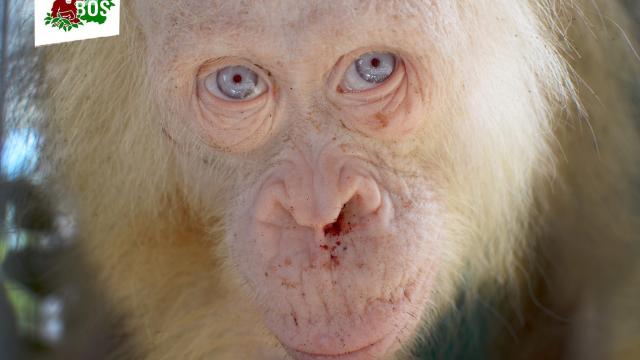A conservation group has rescued an incredibly rare albino orangutan from villagers on the Indonesian part of Borneo island, who were keeping the blue-eyed, white-haired primate in a cage. Sick, dehydrated and exhibiting signs of a bloody nose, it could take a month before the ape can be released back to the wild.
Image: Borneo Orangutan Survival Foundation
The group responsible for the rescue, the Borneo Orangutan Survival Foundation, learned about the five-year-old female orangutan from the Kapuas Hulu Police, who also participated in the rescue. Here’s an excerpt from the BOSF’s official statement about the incident:
A preliminary physical examination conducted by our medical team has determined this is an albino orangutan: her hair, eye, and skin colour is paler than normal, and she is also sensitive to light. We will continue to observe her and conduct routine health tests. She was held captive by local residents for two days and still displays wild behaviours, meaning there is a good chance she could soon be released back to a natural habitat.
Images showed dried blood beneath the orangutan’s nose, which the conservation group believes is the result of an injury sustained when the ape was trying to resist capture by the villagers, who live in the remote Borneo village of Tanggirang.

Image: Borneo Orangutan Survival Foundation
In an interview with AFP, BOSF spokesman Nico Hermanu said it’s the first time the conservation group has taken care of an albino orangutan at its rehabilitation centre. “Orangutans are rare, and an albino orangutan is even rarer,” he said. Workers at the facility said it might be a month before the ape can be released back into the wild, as she was in physically “weak condition” when found, reports the Jakarta Post. The orangutan is suffering from a worm infection and severe dehydration.
This species of great ape is currently listed as “critically endangered” by the International Union for Conservation of Nature, and there are an estimated 100,000 orangutans left in Borneo, down from the nearly 300,000 orangutans who populated the region a half-century ago. Loss of habitat is the leading cause of the population decline.
Interestingly, the discovery of this rare ape may be a sign that other albinos are out there in the wild. “There must be orangutans living in the forests from whom the albino orangutan inherited the disorder, for it is genetic,” said BOSF CEO Jamartin Sihite in the Jakarta Post.
